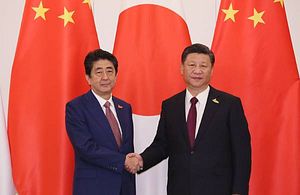On September 28, Japanese Prime Minister Shinzo Abe, accompanied by Foreign Minister Taro Kono, attended a ceremony marking China’s upcoming National Day as well as the 45th anniversary of the normalization of Japan-China relations at the Chinese Embassy in Tokyo. It was the first time in 15 years that a Japanese prime minister had attended the annual event.
Japanese government officials said that Abe decided to attend the event immediately before the ceremony, and Japan and China exchanged official congratulatory telegrams at the ceremony for the first time in 10 years, according to the Asahi Shimbun.
Xinhua reported that about 2,000 people, including government officials, lawmakers, overseas Chinese citizens and employees of Chinese enterprises, attended the ceremony.
According to both Chinese and Japanese media reports, in a public speech at the event, Abe said that stronger cooperation between Japan and China is not only important to both countries, but also indispensable to peace and prosperity of Asia, “given the current situation” in the region. He said that he is willing to make efforts to strengthen the bilateral ties that would benefit both Japan and China. Furthermore, he offered an invitation to Chinese President Xi Jinping: “The next thing will be my turn to visit China. After my visit to China, I want President Xi to visit Japan.”
In addition, the Asahi Shimbun reported that Foreign Minister Kono expressed his hope to visit China “as early as possible,” in order to “discuss concrete measures for bilateral cooperation.”
On China’s part, Cheng Yonghua, Chinese ambassador to Japan, said at the event that the relationship between China and Japan faces some complications but is improving.
At the regular Chinese foreign ministry press briefing in Beijing, spokesperson Lu Kang said China welcomed the attendance of Abe and other senior Japanese officials at the reception. He added:
The 45th anniversary of the normalization of China-Japan diplomatic relations is an important juncture. We hope that the Japanese side can make concerted efforts with China to take the opportunity of the 45th anniversary to…steadily advance exchanges and cooperation and promote the … bilateral relations in the right direction…
With the unexpected attendance, Abe has successfully sent a strong friendly signal to China, and China seems to have cautiously accepted it.
There may have also been a domestic motivation for Abe’s surprising gesture. On September 28 Abe formally dissolved the House of Representatives of the Japanese Parliament (the Diet), triggering a snap election to take place by the end of October.
“Abe probably thought that showing a stance of tackling diplomatic challenges positively will be beneficial for the election. Therefore, he took part in the ceremony despite it being the day of the dissolution,” one Japanese official told the Asahi Shimbun.
If this is the case, perhaps Abe’s friendly signal is just a temporary tactic. He might switch back to a harder stance toward China after his party returns to control of the Diet with a fresh mandate.

































